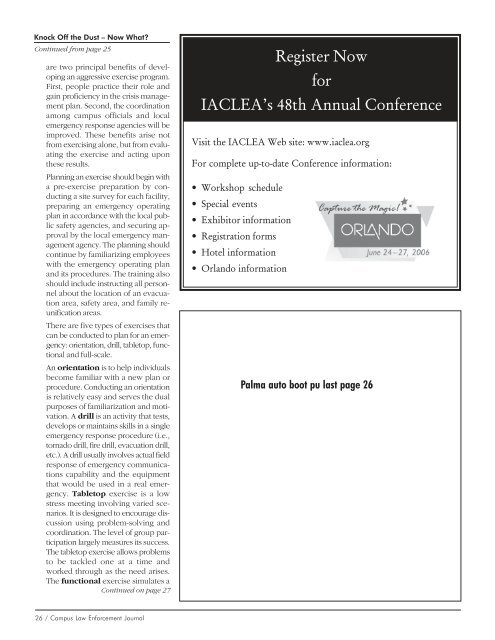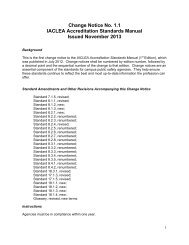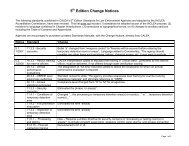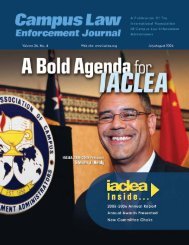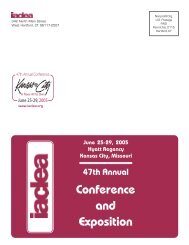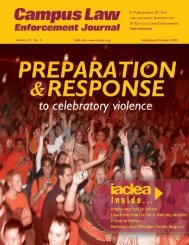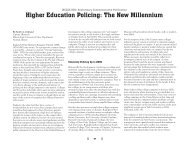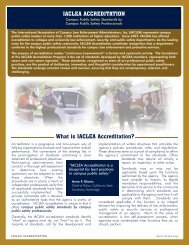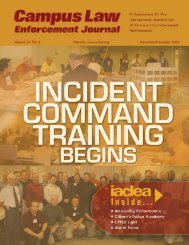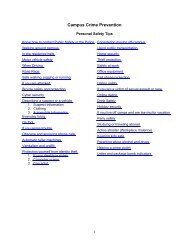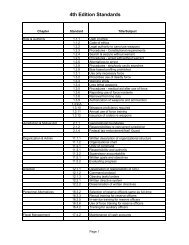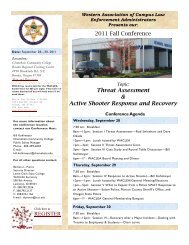Volume 36, No. 2 - March/April 2006 Campus Law ... - IACLEA
Volume 36, No. 2 - March/April 2006 Campus Law ... - IACLEA
Volume 36, No. 2 - March/April 2006 Campus Law ... - IACLEA
Create successful ePaper yourself
Turn your PDF publications into a flip-book with our unique Google optimized e-Paper software.
Knock Off the Dust – <strong>No</strong>w What?<br />
Continued from page 25<br />
are two principal benefits of developing<br />
an aggressive exercise program.<br />
First, people practice their role and<br />
gain proficiency in the crisis management<br />
plan. Second, the coordination<br />
among campus officials and local<br />
emergency response agencies will be<br />
improved. These benefits arise not<br />
from exercising alone, but from evaluating<br />
the exercise and acting upon<br />
these results.<br />
Planning an exercise should begin with<br />
a pre-exercise preparation by conducting<br />
a site survey for each facility,<br />
preparing an emergency operating<br />
plan in accordance with the local public<br />
safety agencies, and securing approval<br />
by the local emergency management<br />
agency. The planning should<br />
continue by familiarizing employees<br />
with the emergency operating plan<br />
and its procedures. The training also<br />
should include instructing all personnel<br />
about the location of an evacuation<br />
area, safety area, and family reunification<br />
areas.<br />
There are five types of exercises that<br />
can be conducted to plan for an emergency:<br />
orientation, drill, tabletop, functional<br />
and full-scale.<br />
An orientation is to help individuals<br />
become familiar with a new plan or<br />
procedure. Conducting an orientation<br />
is relatively easy and serves the dual<br />
purposes of familiarization and motivation.<br />
A drill is an activity that tests,<br />
develops or maintains skills in a single<br />
emergency response procedure (i.e.,<br />
tornado drill, fire drill, evacuation drill,<br />
etc.). A drill usually involves actual field<br />
response of emergency communications<br />
capability and the equipment<br />
that would be used in a real emergency.<br />
Tabletop exercise is a low<br />
stress meeting involving varied scenarios.<br />
It is designed to encourage discussion<br />
using problem-solving and<br />
coordination. The level of group participation<br />
largely measures its success.<br />
The tabletop exercise allows problems<br />
to be tackled one at a time and<br />
worked through as the need arises.<br />
The functional exercise simulates a<br />
Continued on page 27<br />
Register <strong>No</strong>w<br />
for<br />
<strong>IACLEA</strong>’s 48th Annual Conference<br />
Visit the <strong>IACLEA</strong> Web site: www.iaclea.org<br />
For complete up-to-date Conference information:<br />
• Workshop schedule<br />
• Special events<br />
• Exhibitor information<br />
• Registration forms<br />
• Hotel information<br />
• Orlando information<br />
Palma auto boot pu last page 26<br />
26 / <strong>Campus</strong> <strong>Law</strong> Enforcement Journal


